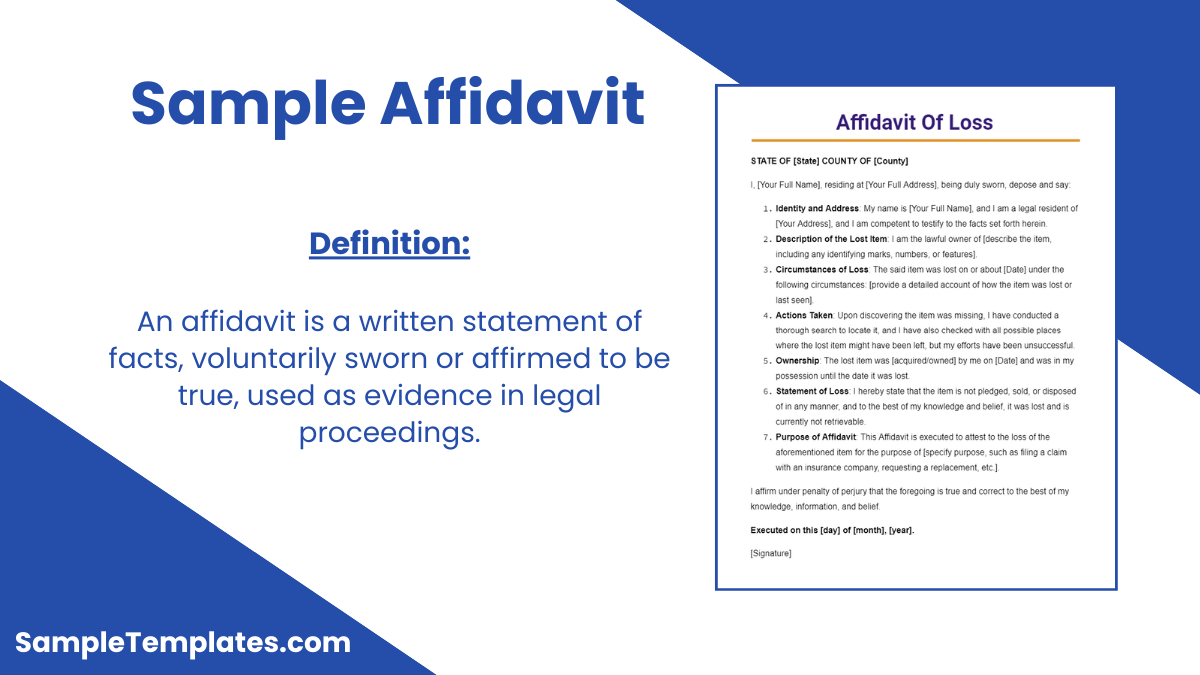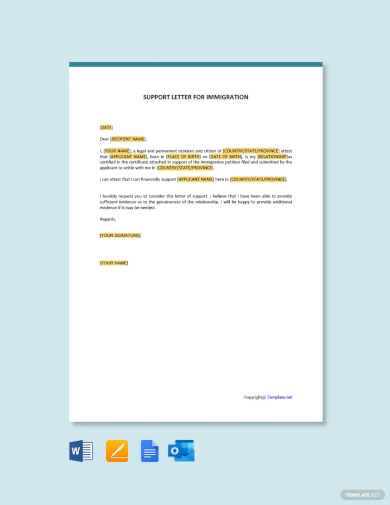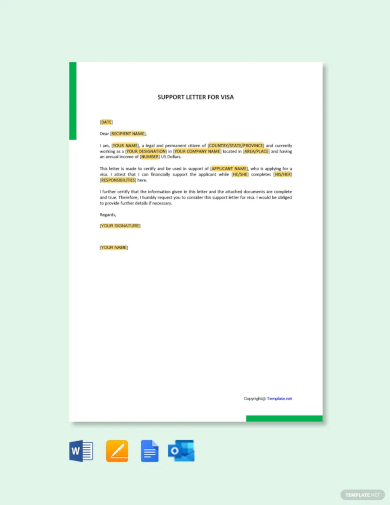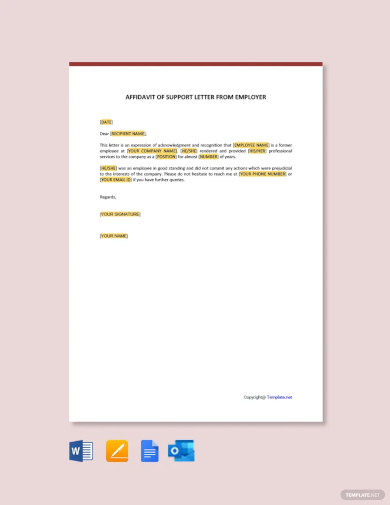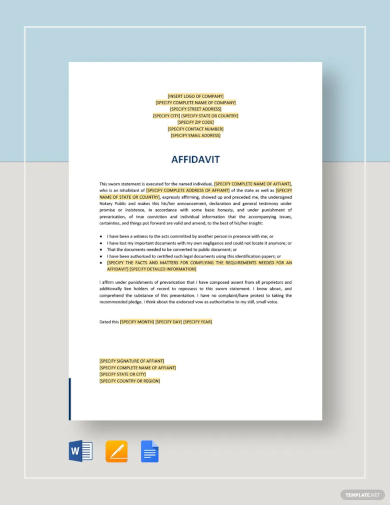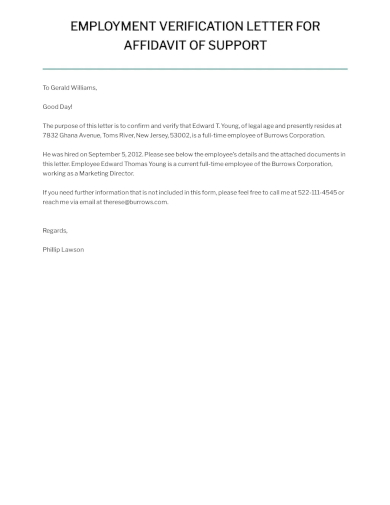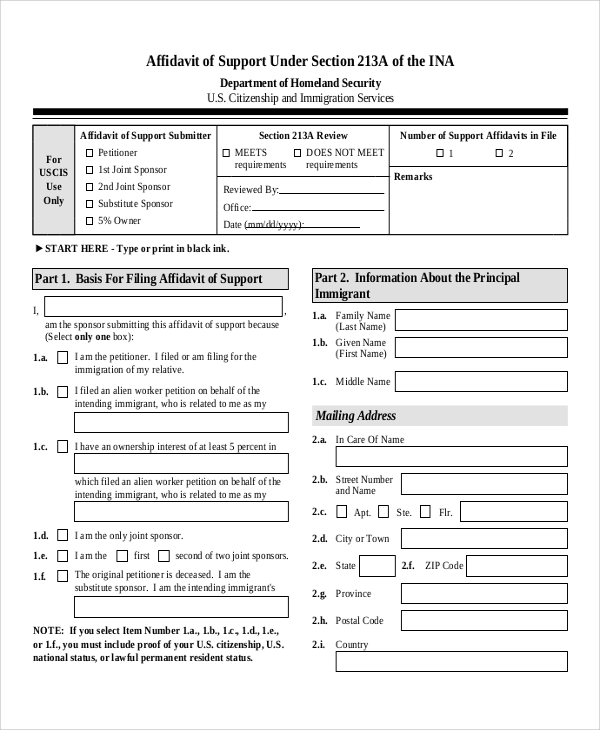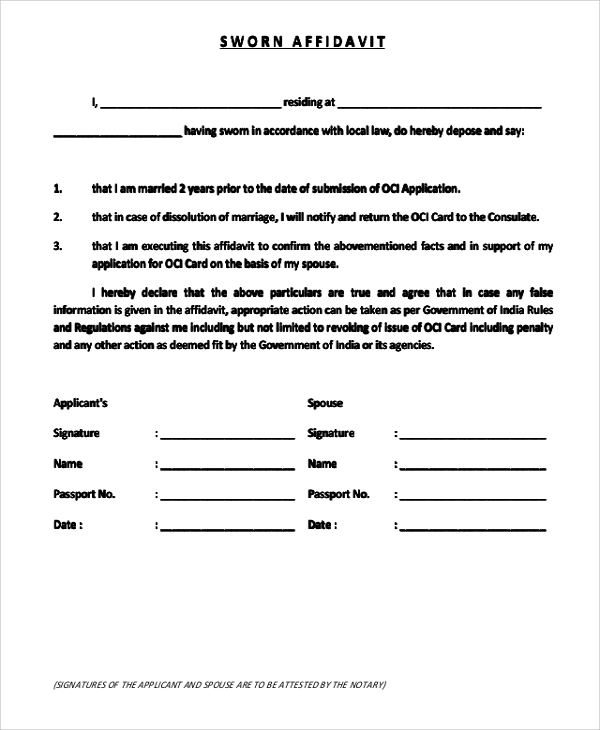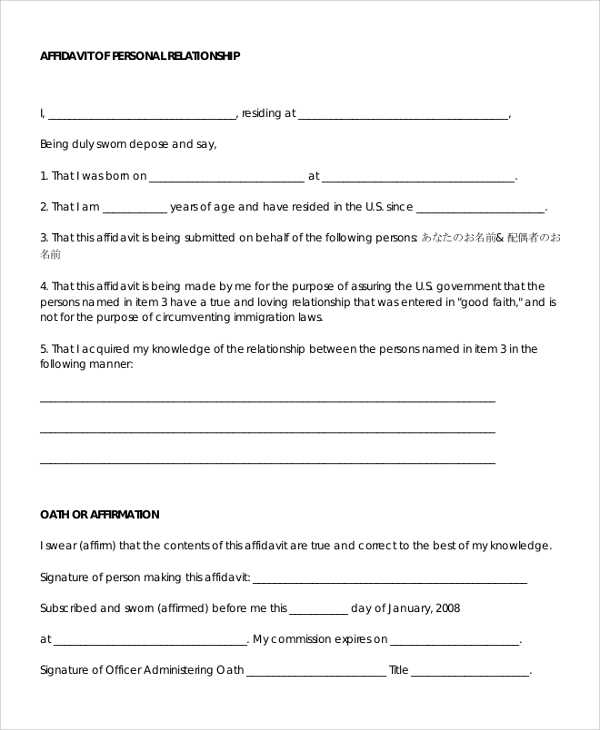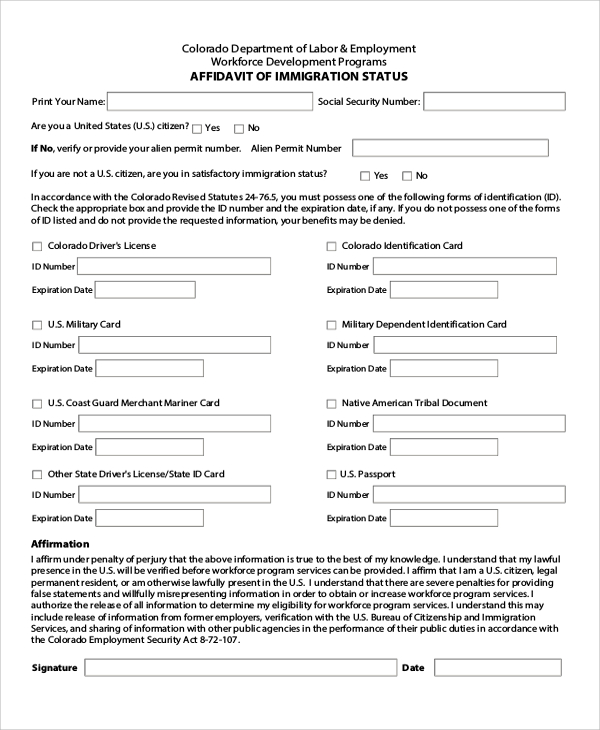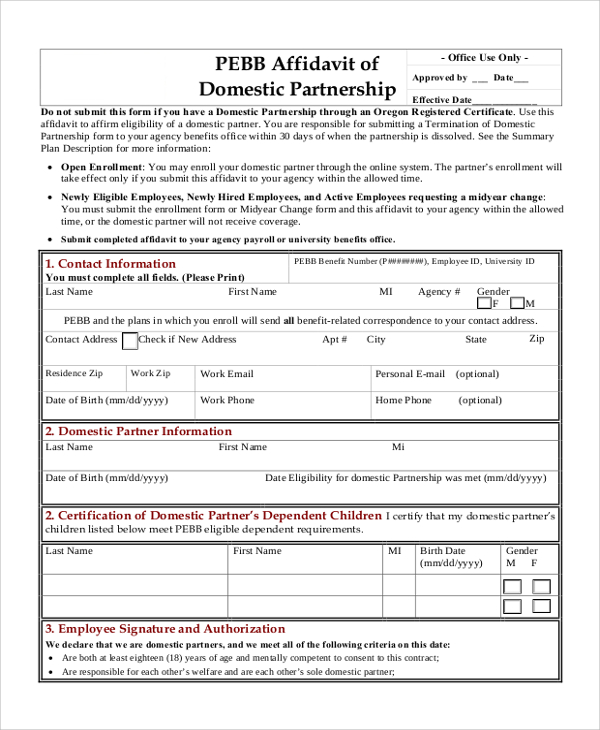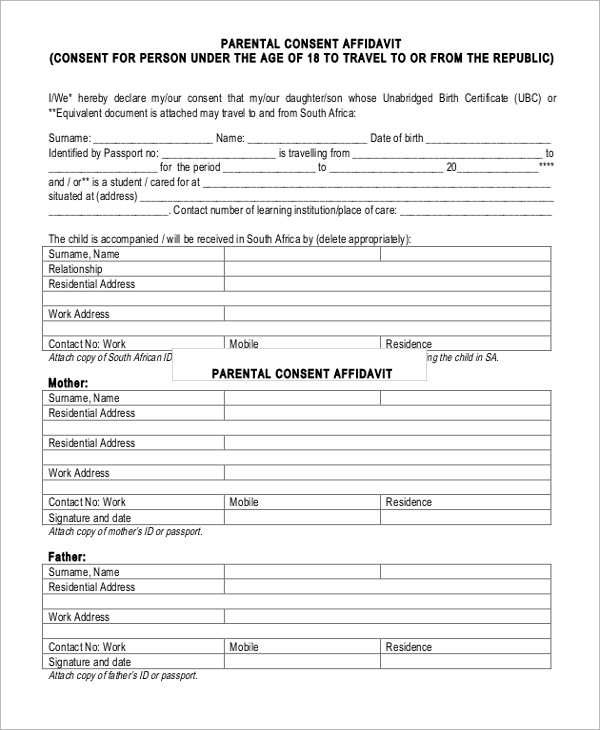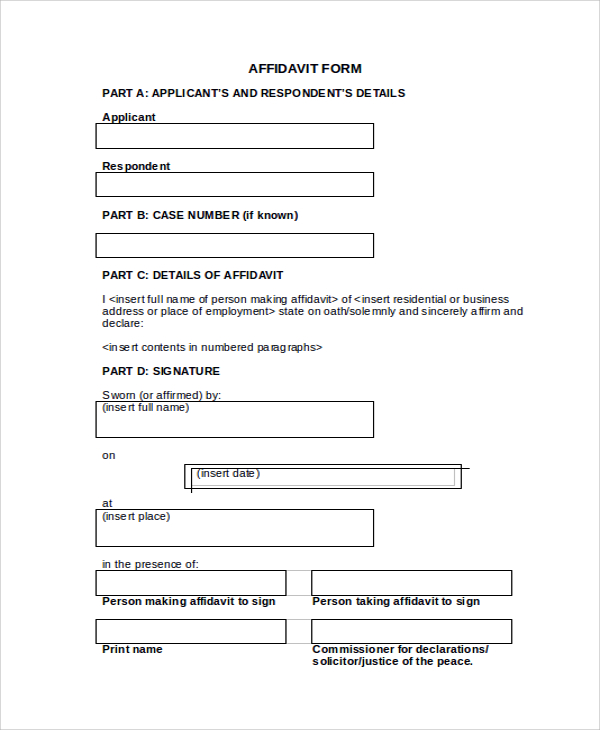An affidavit contains and verifies the statement of facts voluntarily stated by an affiant under oath supervised by an authorized legal person. In the case of a dispute arising from the facts, anyone who has the intellectual capacity can state his knowledge of the disputed facts from his experience and direct observation. No age bar restricts anyone from making an affidavit. An array of Blank Affidavit forms is presented to help affiants with the patterns.
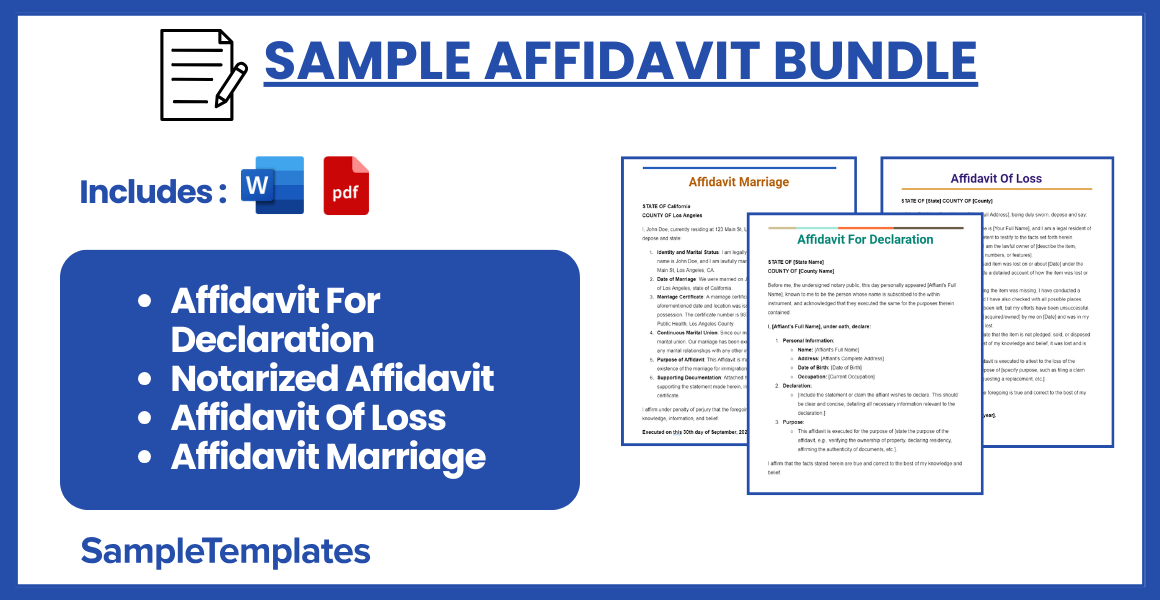
Download Sample Affidavit Bundle
Affidavit For Declaration
STATE OF [State Name]
COUNTY OF [County Name]
Before me, the undersigned notary public, this day personally appeared [Affiant’s Full Name], known to me to be the person whose name is subscribed to the within instrument, and acknowledged that they executed the same for the purposes therein contained.
I, [Affiant’s Full Name], under oath, declare:
- Personal Information:
- Name: [Affiant’s Full Name]
- Address: [Affiant’s Complete Address]
- Date of Birth: [Date of Birth]
- Occupation: [Current Occupation]
- Declaration:
- [Include the statement or claim the affiant wishes to declare. This should be clear and concise, detailing all necessary information relevant to the declaration.]
- Purpose:
- This affidavit is executed for the purpose of [state the purpose of the affidavit, e.g., verifying the ownership of property, declaring residency, affirming the authenticity of documents, etc.].
I affirm that the facts stated herein are true and correct to the best of my knowledge and belief.
[Affiant’s Signature]
Date: [Date of Signing]
Sworn to and subscribed before me this [day] day of [month], [year].
[Signature of Notary Public]
My Commission Expires: [Expiration date of Notary’s commission]
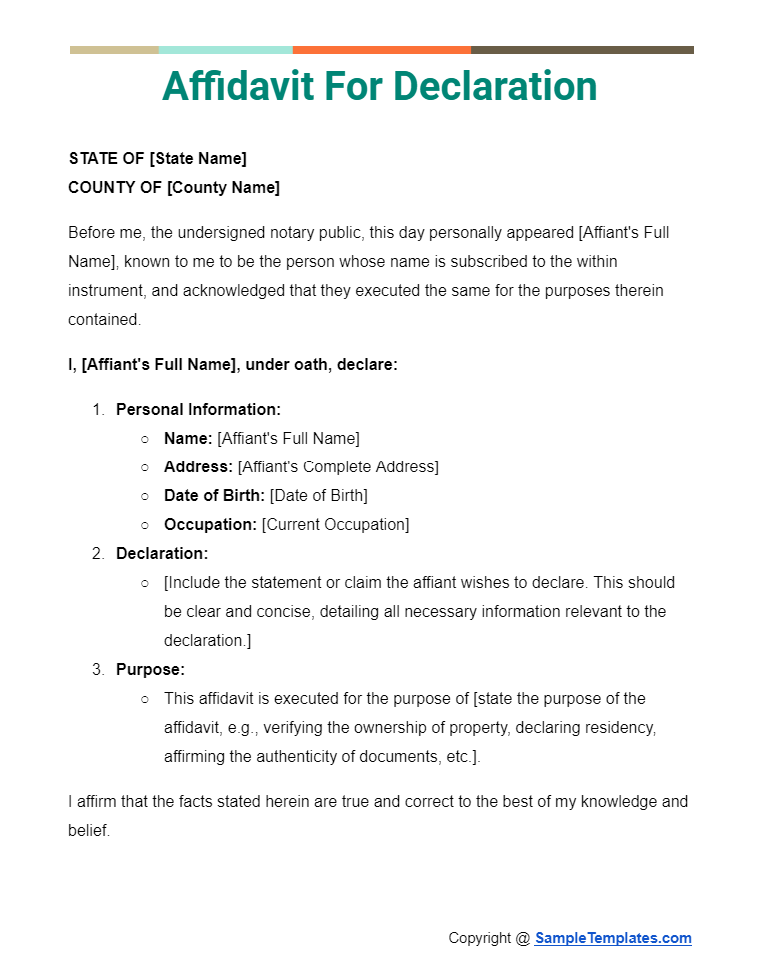
Notarized Affidavit
STATE OF CALIFORNIA
COUNTY OF LOS ANGELES
I, John A. Doe, residing at 1234 Maple Street, Los Angeles, California, being duly sworn, depose and state the following under penalty of perjury:
- Fact 1: I am the lawful owner of the vehicle with VIN 1HGBH41JXMN109186.
- Fact 2: The vehicle was purchased on January 15, 2023, from Fast Motors, Inc.
- Fact 3: I have not altered the odometer of the aforementioned vehicle, which currently reads 25,000 miles.
I make this affidavit for the purpose of providing proof of ownership and asserting the authenticity of the vehicle’s condition and history for its registration.
I understand that providing false statements within this affidavit constitutes an offense and may result in legal consequences.
AFFIANT:
[Signature of John A. Doe]
John A. Doe
September 30, 2024
SUBSCRIBED AND SWORN TO BEFORE ME on this 30th day of September, 2024, by John A. Doe, proven to me on the basis of satisfactory evidence to be the person who appeared before me.
NOTARY PUBLIC:
[Signature of Notary Public]
Jane C. Smith
[Seal of Notary Public]
My commission expires: December 31, 2025
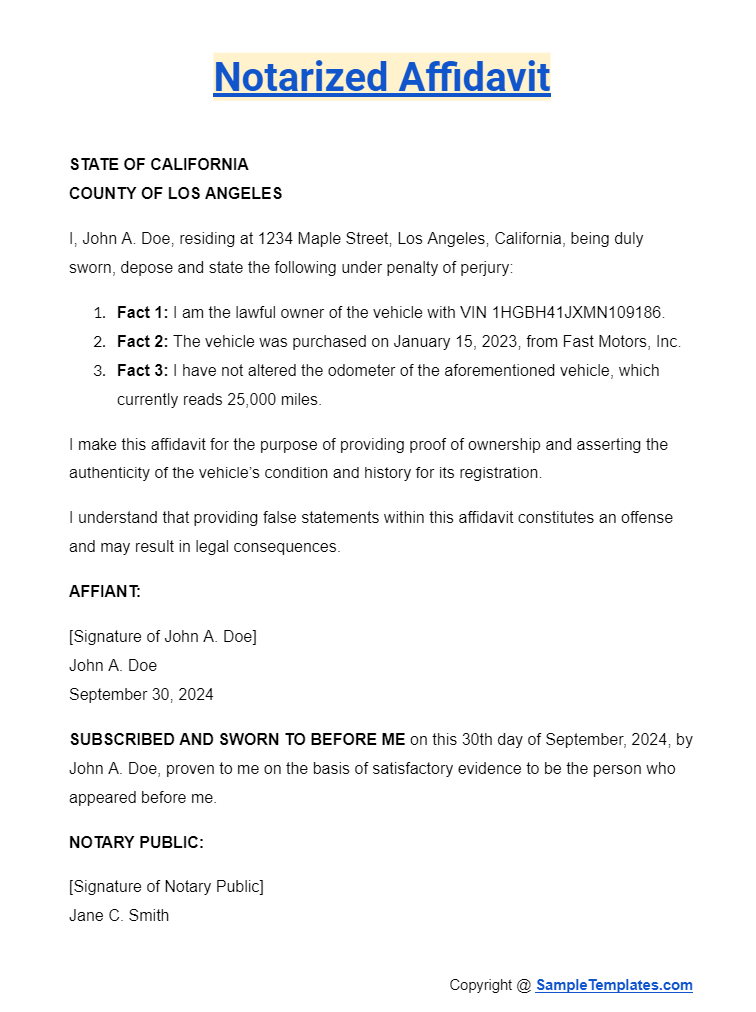
Affidavit Of Loss
STATE OF [State] COUNTY OF [County]
I, [Your Full Name], residing at [Your Full Address], being duly sworn, depose and say:
- Identity and Address: My name is [Your Full Name], and I am a legal resident of [Your Address], and I am competent to testify to the facts set forth herein.
- Description of the Lost Item: I am the lawful owner of [describe the item, including any identifying marks, numbers, or features].
- Circumstances of Loss: The said item was lost on or about [Date] under the following circumstances: [provide a detailed account of how the item was lost or last seen].
- Actions Taken: Upon discovering the item was missing, I have conducted a thorough search to locate it, and I have also checked with all possible places where the lost item might have been left, but my efforts have been unsuccessful.
- Ownership: The lost item was [acquired/owned] by me on [Date] and was in my possession until the date it was lost.
- Statement of Loss: I hereby state that the item is not pledged, sold, or disposed of in any manner, and to the best of my knowledge and belief, it was lost and is currently not retrievable.
- Purpose of Affidavit: This Affidavit is executed to attest to the loss of the aforementioned item for the purpose of [specify purpose, such as filing a claim with an insurance company, requesting a replacement, etc.].
I affirm under penalty of perjury that the foregoing is true and correct to the best of my knowledge, information, and belief.
Executed on this [day] of [month], [year].
[Signature]
[Printed Name]
Subscribed and sworn to before me this [day] of [month], [year].
[Notary Public’s Signature]
[Notary Public’s Printed Name]
My Commission Expires: [Expiration Date of Notary Public’s Commission]
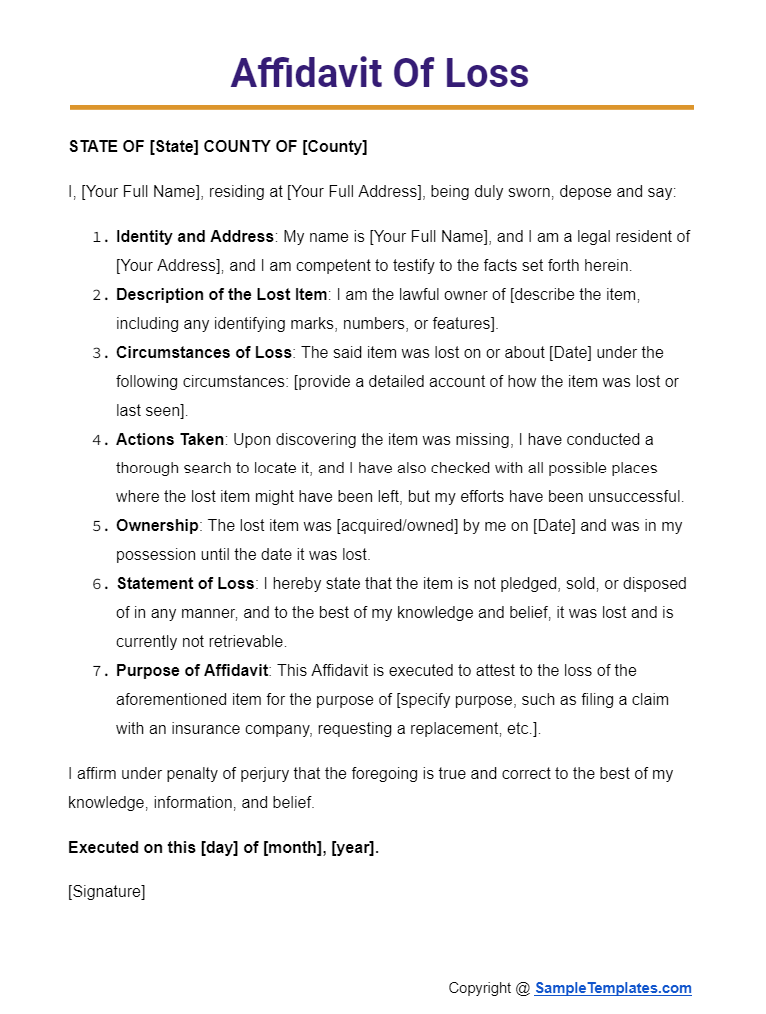
Affidavit Marriage
STATE OF California
COUNTY OF Los Angeles
I, John Doe, currently residing at 123 Main St, Los Angeles, CA, being duly sworn, depose and state:
- Identity and Marital Status: I am legally competent to make this affidavit. My name is John Doe, and I am lawfully married to Jane Smith, who resides at 123 Main St, Los Angeles, CA.
- Date of Marriage: We were married on June 15, 2020, at City Hall, in the county of Los Angeles, state of California.
- Marriage Certificate: A marriage certificate confirming our marriage on the aforementioned date and location was issued to us and remains in our possession. The certificate number is 987654321, issued by the Department of Public Health, Los Angeles County.
- Continuous Marital Union: Since our marriage, we have lived in a continuous marital union. Our marriage has been exclusive and we have not entered into any marital relationships with any other individual since our wedding date.
- Purpose of Affidavit: This Affidavit is made for the purpose of asserting the existence of the marriage for immigration paperwork required by the USCIS.
- Supporting Documentation: Attached herewith are copies of documents supporting the statement made herein, including a copy of our marriage certificate.
I affirm under penalty of perjury that the foregoing is true and correct to the best of my knowledge, information, and belief.
Executed on this 30th day of September, 2024.
[Signature]
John Doe
Subscribed and sworn to before me this 30th day of September, 2024.
[Notary Public’s Signature]
[Notary Public’s Printed Name]
My Commission Expires: December 31, 2026
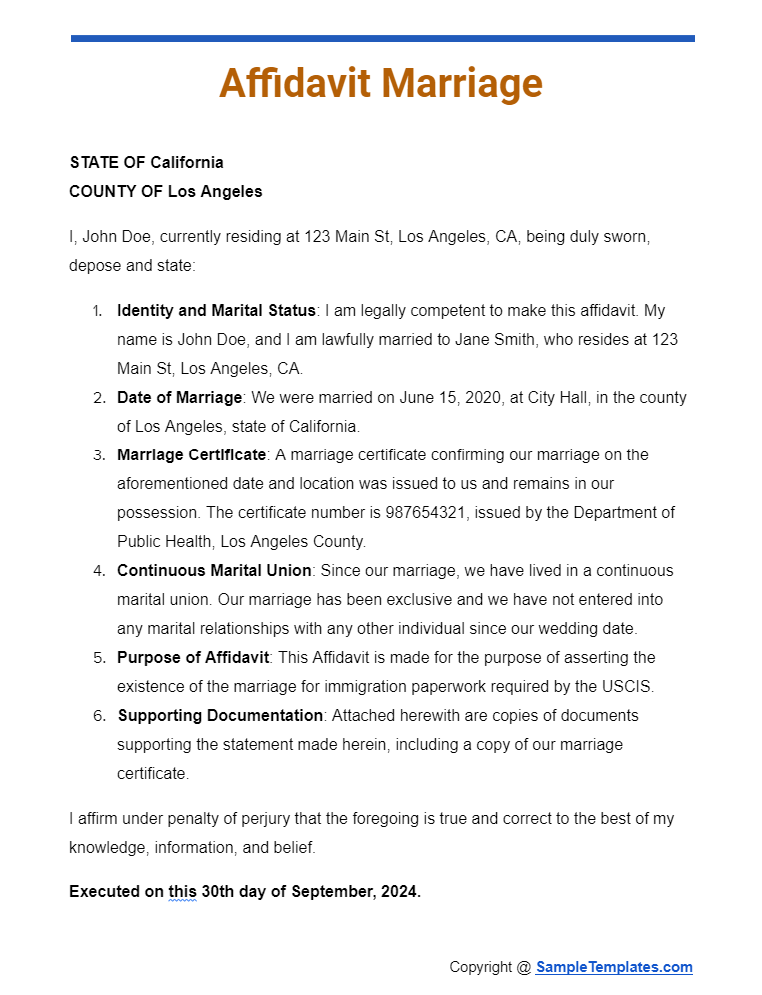
Browse More Templates On Affidavit
Affidavit of Support Letter For Immigration Template
Affidavit of Support Letter for Visa Template
Affidavit of Support Letter from Employer Template
How to Write a Affidavit?
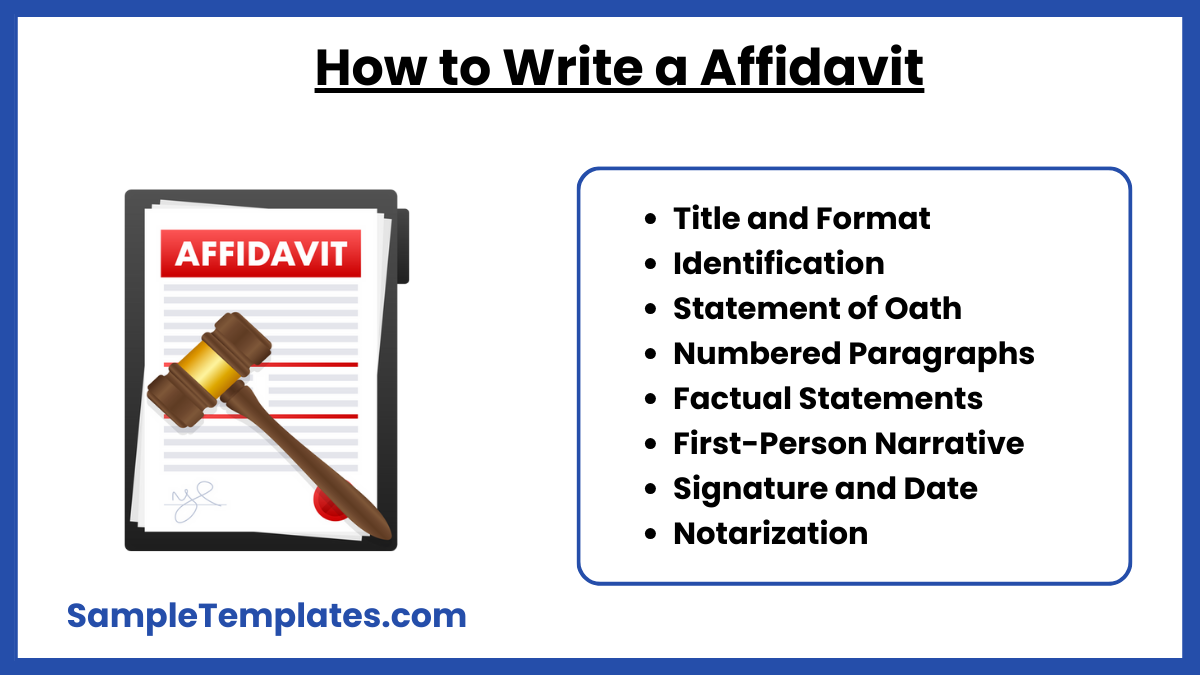
- Title and Format: Start by titling the document as “Affidavit” at the top of the page. Specify the subject of the affidavit to provide immediate context, such as “Affidavit of Marriage” or “Affidavit of Residency.” You can also see more on Affidavit of Work.
- Identification: Clearly identify yourself, the affiant, by full name, address, and sometimes other identifying information, such as your date of birth or occupation. This establishes the credibility of the affiant.
- Statement of Oath: Begin the body of the affidavit with a statement declaring that you are swearing under oath or affirming the truthfulness of the information and statements that follow. This is crucial as affidavits are legal documents.
- Numbered Paragraphs: Organize the content into numbered paragraphs. Each paragraph should contain a specific statement or fact. This makes the affidavit easier to read and reference.
- Factual Statements: Include only factual statements that you can personally attest to. Each fact should be clear and concise. Avoid opinions or assumptions. You can also see more on Affidavit Forms.
- First-Person Narrative: Write the affidavit in the first person, using simple and straightforward language. The tone should be formal, but the language should not be overly complex.
- Signature and Date: At the end of the affidavit, include a line for your signature and the date. This officially indicates your acknowledgment that you are making these statements under oath.
- Notarization: The affidavit must be signed in the presence of a notary public or another official authorized to administer oaths. The notary will sign and seal the document to certify that you have sworn or affirmed the statements made in the affidavit in their presence. You can also see more on Affidavit Statement.
Affidavit Template
Employment Verification Letter for Affidavit of Support Template
Sample Affidavit of Support Letter Template
It’s a certification that states the details of a sponsor including his name, contact details, the present financial position with attached valid process documentation and his consent to sponsor a student’s education.
Uses of Affidavit
- Legal Proceedings: Affidavits are often used in court cases to provide sworn evidence from a witness who cannot be present during the proceedings. They are also used to assert certain facts before a trial begins.
- Immigration: In immigration cases, affidavits can support claims made by the applicant, such as the authenticity of a marriage in spouse-based visa applications or the character of the applicant through letters of support from friends and family. You can also see more on Affidavit of Relationship.
- Financial Transactions: They are used to declare financial status or verify financial information, often required in loan applications, mortgage lending, and other financial agreements.
- Property Claims: Affidavits can assert ownership or the right to use property, useful in disputes, transfers, or claims such as lost property deeds or vehicle titles.
- Insurance: In the insurance industry, affidavits are used to claim losses, verify the occurrence of events, or detail an accident, helping the insurance company decide on claim settlements.
- Identity Verification: Used to legally assert aspects of one’s identity, such as name changes, or to rectify discrepancies in personal records on official documents like birth certificates.
- Estate Settlements: After someone dies, family members may use affidavits to claim inheritance rights or assert facts about the deceased’s last wishes if a will is absent or unclear. You can also see more on Sworn Affidavit Forms.
- Family Law: In family law, affidavits are used to provide statements regarding childcare, custody arrangements, and divorce proceedings, outlining the affiant’s observations or experiences relevant to the case.
Affidavit of Citizenship and Immigration Service Example
These states the details required of sponsor/s and sponsored for the immigration process. It specifies the legal effects, obligations and consequences entailed Besides contact details, employment evaluation and personal details of both.
Sample Sworn Affidavit in PDF
It’s an sample application with a declaration for overseas citizenship by one’s spouse. The notary must attest applicant’s signatures, and consulate must be informed if marriage is dissolved.
Common Types of Affidavits
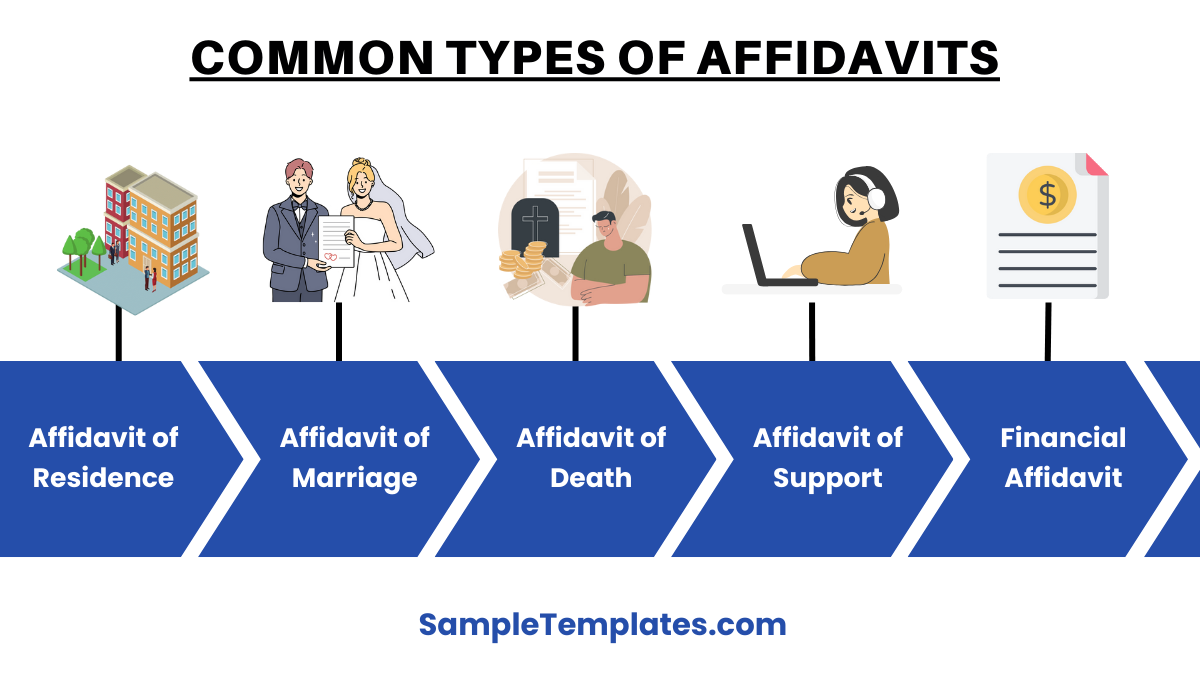
- Affidavit of Residence: Used to legally declare one’s current place of residence. This is often required in situations involving school registrations or voter registration. You can also see more on Affidavit Letter.
- Affidavit of Marriage: Utilized to formally assert the existence of a marriage between two individuals, typically required for insurance, immigration, or spousal benefits.
- Affidavit of Death: This document confirms the death of an individual and is often used in the administration of an estate or in executing the deceased’s will.
- Affidavit of Heirship: Applied in estate proceedings when a person dies without a will, detailing the known heirs and their relationship to the deceased.
- Affidavit of Name Change: Used by individuals who wish to legally confirm their name change, for various personal or legal reasons. You can also see more on Affidavit of Employment.
- Affidavit of Support: Commonly used in immigration cases, where the affiant declares financial support for the visa applicant, proving they have the means to support the person entering the country.
- Affidavit of Service: Documents the delivery of legal documents, such as summons or complaints, to a party in a legal case, asserting that the documents were properly served.
- Financial Affidavit: A declaration of one’s income, expenses, assets, and liabilities, often used in divorce proceedings or to qualify for legal aid.
To whom are these Affidavit Samples Beneficial?
Affidavit Samples are beneficial to a broad range of people. For instance, a student must submit affidavits before admission essay to an institution stating a scholarship, compliance to ragging rules. Immigrants desiring an immigration visa or a raise to permanent citizenship might also use affidavits with a sponsor to state his case and authenticity.
One might ask for a birth certificate with valid reasons of not procuring one earlier or one might affirm of a personal relationship between two individuals to prove their compliance with immigration laws. Besides, people in business sectors, judicial and administrative sectors might benefit from these samples.
Printable Affidavit of Personal Relationship Template
This is a statement of purpose where one states his personal details and the knowledge of a personal relationship initiated between two individuals and deposes their aim wasn’t to circumvent immigration laws.
Sample Birth Affidavit Letter Template
It’s application under oath for a birth certificate sample with evidence proving why the person in question couldn’t obtain one earlier besides the name, date of birth, address details of both parents.
Importance of Affidavit
- Legal Evidence: Affidavits provide a convenient method for presenting evidence in court proceedings without the need for the affiant to be present. They are especially useful when live testimony is impractical or unnecessary. You can also see more on General Affidavit.
- Verification of Information: They serve to officially verify written statements, ensuring that information is not only declared but sworn to be true, which can be critical for processes that rely on the accuracy of provided information, such as financial disclosures or property claims.
- Enforcement of Law: Affidavits help in enforcing laws by providing a legal method through which individuals can declare facts under oath, contributing to the integrity and efficiency of legal proceedings and administrative processes.
- Facilitates Transactions: In transactions involving property or finance, affidavits can confirm the status or condition of assets involved, facilitating smoother transactions by providing assurances to all parties.
- Regulatory Compliance: Many regulatory processes require affidavits as part of compliance filings to affirm that certain actions have been taken or conditions met, thus serving as a compliance and monitoring tool for regulatory bodies. You can also see more on Affidavit of Support Letter.
- Conflict Resolution: By providing a formal means to assert facts, affidavits can help resolve disputes before they escalate into more serious legal confrontations, potentially saving time and resources for all parties involved.
- Identity Verification: Affidavits can be used to affirm identity details, helping in cases where official documents need correction or when proving identity for legal purposes.
- Support Legal Changes: Whether it’s changing one’s name legally or settling the estate of a deceased person, affidavits support these processes by providing a sworn statement that helps facilitate legal changes smoothly and correctly.
Affidavit of Immigration Status Template
Why are Affidavit Samples Useful?
Affidavit Samples are useful to help affiants with the patterns required for filing different types of affidavits suiting their particular requirements. As affidavit Forms might benefit an applicant who desires an overseas citizenship of a country by his spouse and one is also informed that in the case study of dissolution of marriage, the citizenship must be returned.
The samples are very informative and precise outlining the personal and other necessary details required of the persons involved in the case and also states the conditions, consequences, of such an action plan, promised administered by a legally authorized individual or institution.
Sample Affidavit of Domestic Partnership in PDF
Parental Consent Affidavit Template
Sample Affidavit Form in DOC
Affidavit Samples are utile to people interested in sponsoring education, immigration visa, affirming personal relationship and sponsored or spouses applying for citizenship. The Affidavit of Support, enforceable by law in the U.S states a sponsor as the petitioner for an immigrant family and his responsibility until they acquire full citizenship.
What not to write in an affidavit?
Avoid opinions, irrelevant facts, hearsay, and emotional language. Stick to factual, firsthand knowledge that directly relates to the case. You can also see more on Affidavit of Explanation.
Can I download an affidavit form?
Yes, affidavit forms can be downloaded from various legal websites, state court websites, or can be provided by attorneys.
Are affidavits good evidence?
Yes, affidavits are considered good evidence as they are sworn statements; however, they may be challenged for authenticity or completeness in court. You can also see more on Affidavit of Loss.
What is a self-affidavit?
A self-affidavit is a document in which an individual swears under oath to the truthfulness of their own statements, without third-party verification.
How powerful is an affidavit?
Affidavits are powerful legal tools as they serve as sworn evidence in legal proceedings, carrying weight in decisions when properly substantiated. You can also see more on Company Affidavit.
What are the risks of signing an affidavit?
Signing an affidavit carries risks such as potential perjury charges if the information is false or inaccurate. Always ensure truthfulness and completeness.
If you have any DMCA issues on this post, please contact us.
Related Posts
Sample Business Card Templates
Sample Cashier Job Descriptions
Questionnaire Samples
FREE 10+ Sample HR Resource Templates in PDF
FREE 10+ HR Consulting Business Plan Samples in MS Word | Google Docs | Pages | PDF
FREE 49+ Sample Job Descriptions in PDF | MS Word
FREE 16+ Nonprofit Budget Samples in PDF | MS Word | Excel | Google Docs | Google Sheets | Numbers | Pages
FREE 13+ Academic Calendar Templates in Google Docs | MS Word | Pages | PDF
FREE 10+ How to Create an Executive Summary Samples in Google Docs | MS Word | Pages | PDF
FREE 23+ Sample Event Calendar Templates in PDF | MS Word | Google Docs | Apple Pages
Company Profile Samples
FREE 10+ Leadership Report Samples [ Development, Training, Camp ]
FREE 24+ Sample Payment Schedules in PDF | MS Word
FREE 10+ Return to Work Action Plan Samples in PDF | DOC
Autobiography Samples & Templates
